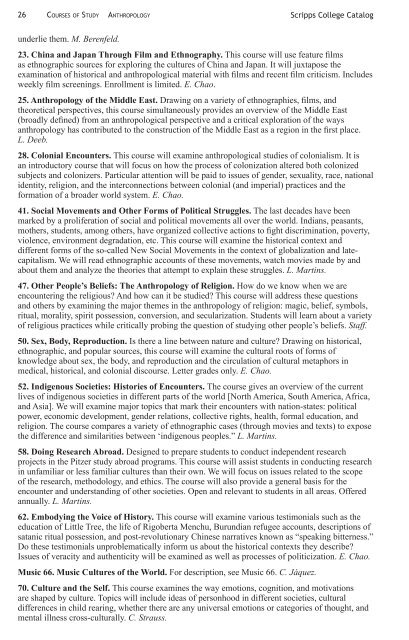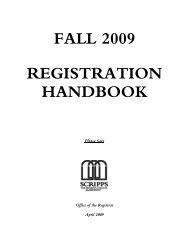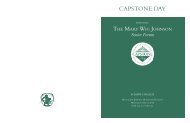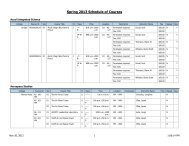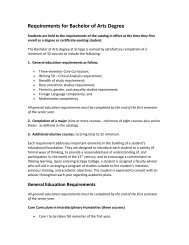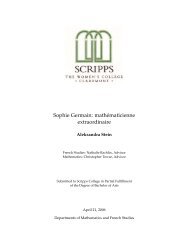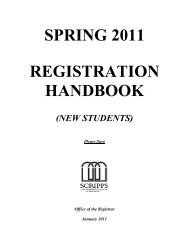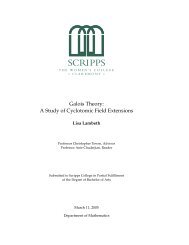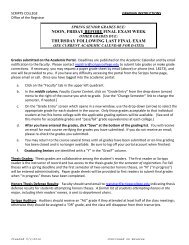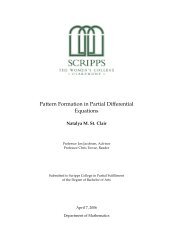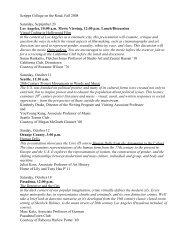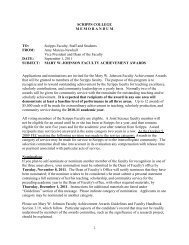PDF of the 2012-2013 Academic Catalog - Scripps College
PDF of the 2012-2013 Academic Catalog - Scripps College
PDF of the 2012-2013 Academic Catalog - Scripps College
Create successful ePaper yourself
Turn your PDF publications into a flip-book with our unique Google optimized e-Paper software.
26 Courses <strong>of</strong> Study Anthropology <strong>Scripps</strong> <strong>College</strong> <strong>Catalog</strong><br />
underlie <strong>the</strong>m. M. Berenfeld.<br />
23. China and Japan Through Film and Ethnography. This course will use feature films<br />
as ethnographic sources for exploring <strong>the</strong> cultures <strong>of</strong> China and Japan. It will juxtapose <strong>the</strong><br />
examination <strong>of</strong> historical and anthropological material with films and recent film criticism. Includes<br />
weekly film screenings. Enrollment is limited. E. Chao.<br />
25. Anthropology <strong>of</strong> <strong>the</strong> Middle East. Drawing on a variety <strong>of</strong> ethnographies, films, and<br />
<strong>the</strong>oretical perspectives, this course simultaneously provides an overview <strong>of</strong> <strong>the</strong> Middle East<br />
(broadly defined) from an anthropological perspective and a critical exploration <strong>of</strong> <strong>the</strong> ways<br />
anthropology has contributed to <strong>the</strong> construction <strong>of</strong> <strong>the</strong> Middle East as a region in <strong>the</strong> first place.<br />
L. Deeb.<br />
28. Colonial Encounters. This course will examine anthropological studies <strong>of</strong> colonialism. It is<br />
an introductory course that will focus on how <strong>the</strong> process <strong>of</strong> colonization altered both colonized<br />
subjects and colonizers. Particular attention will be paid to issues <strong>of</strong> gender, sexuality, race, national<br />
identity, religion, and <strong>the</strong> interconnections between colonial (and imperial) practices and <strong>the</strong><br />
formation <strong>of</strong> a broader world system. E. Chao.<br />
41. Social Movements and O<strong>the</strong>r Forms <strong>of</strong> Political Struggles. The last decades have been<br />
marked by a proliferation <strong>of</strong> social and political movements all over <strong>the</strong> world. Indians, peasants,<br />
mo<strong>the</strong>rs, students, among o<strong>the</strong>rs, have organized collective actions to fight discrimination, poverty,<br />
violence, environment degradation, etc. This course will examine <strong>the</strong> historical context and<br />
different forms <strong>of</strong> <strong>the</strong> so-called New Social Movements in <strong>the</strong> context <strong>of</strong> globalization and latecapitalism.<br />
We will read ethnographic accounts <strong>of</strong> <strong>the</strong>se movements, watch movies made by and<br />
about <strong>the</strong>m and analyze <strong>the</strong> <strong>the</strong>ories that attempt to explain <strong>the</strong>se struggles. L. Martins.<br />
47. O<strong>the</strong>r People’s Beliefs: The Anthropology <strong>of</strong> Religion. How do we know when we are<br />
encountering <strong>the</strong> religious? And how can it be studied? This course will address <strong>the</strong>se questions<br />
and o<strong>the</strong>rs by examining <strong>the</strong> major <strong>the</strong>mes in <strong>the</strong> anthropology <strong>of</strong> religion: magic, belief, symbols,<br />
ritual, morality, spirit possession, conversion, and secularization. Students will learn about a variety<br />
<strong>of</strong> religious practices while critically probing <strong>the</strong> question <strong>of</strong> studying o<strong>the</strong>r people’s beliefs. Staff.<br />
50. Sex, Body, Reproduction. Is <strong>the</strong>re a line between nature and culture? Drawing on historical,<br />
ethnographic, and popular sources, this course will examine <strong>the</strong> cultural roots <strong>of</strong> forms <strong>of</strong><br />
knowledge about sex, <strong>the</strong> body, and reproduction and <strong>the</strong> circulation <strong>of</strong> cultural metaphors in<br />
medical, historical, and colonial discourse. Letter grades only. E. Chao.<br />
52. Indigenous Societies: Histories <strong>of</strong> Encounters. The course gives an overview <strong>of</strong> <strong>the</strong> current<br />
lives <strong>of</strong> indigenous societies in different parts <strong>of</strong> <strong>the</strong> world [North America, South America, Africa,<br />
and Asia]. We will examine major topics that mark <strong>the</strong>ir encounters with nation-states: political<br />
power, economic development, gender relations, collective rights, health, formal education, and<br />
religion. The course compares a variety <strong>of</strong> ethnographic cases (through movies and texts) to expose<br />
<strong>the</strong> difference and similarities between ‘indigenous peoples.” L. Martins.<br />
58. Doing Research Abroad. Designed to prepare students to conduct independent research<br />
projects in <strong>the</strong> Pitzer study abroad programs. This course will assist students in conducting research<br />
in unfamiliar or less familiar cultures than <strong>the</strong>ir own. We will focus on issues related to <strong>the</strong> scope<br />
<strong>of</strong> <strong>the</strong> research, methodology, and ethics. The course will also provide a general basis for <strong>the</strong><br />
encounter and understanding <strong>of</strong> o<strong>the</strong>r societies. Open and relevant to students in all areas. Offered<br />
annually. L. Martins.<br />
62. Embodying <strong>the</strong> Voice <strong>of</strong> History. This course will examine various testimonials such as <strong>the</strong><br />
education <strong>of</strong> Little Tree, <strong>the</strong> life <strong>of</strong> Rigoberta Menchu, Burundian refugee accounts, descriptions <strong>of</strong><br />
satanic ritual possession, and post-revolutionary Chinese narratives known as “speaking bitterness.”<br />
Do <strong>the</strong>se testimonials unproblematically inform us about <strong>the</strong> historical contexts <strong>the</strong>y describe?<br />
Issues <strong>of</strong> veracity and au<strong>the</strong>nticity will be examined as well as processes <strong>of</strong> politicization. E. Chao.<br />
Music 66. Music Cultures <strong>of</strong> <strong>the</strong> World. For description, see Music 66. C. Jáquez.<br />
70. Culture and <strong>the</strong> Self. This course examines <strong>the</strong> way emotions, cognition, and motivations<br />
are shaped by culture. Topics will include ideas <strong>of</strong> personhood in different societies, cultural<br />
differences in child rearing, whe<strong>the</strong>r <strong>the</strong>re are any universal emotions or categories <strong>of</strong> thought, and<br />
mental illness cross-culturally. C. Strauss.


